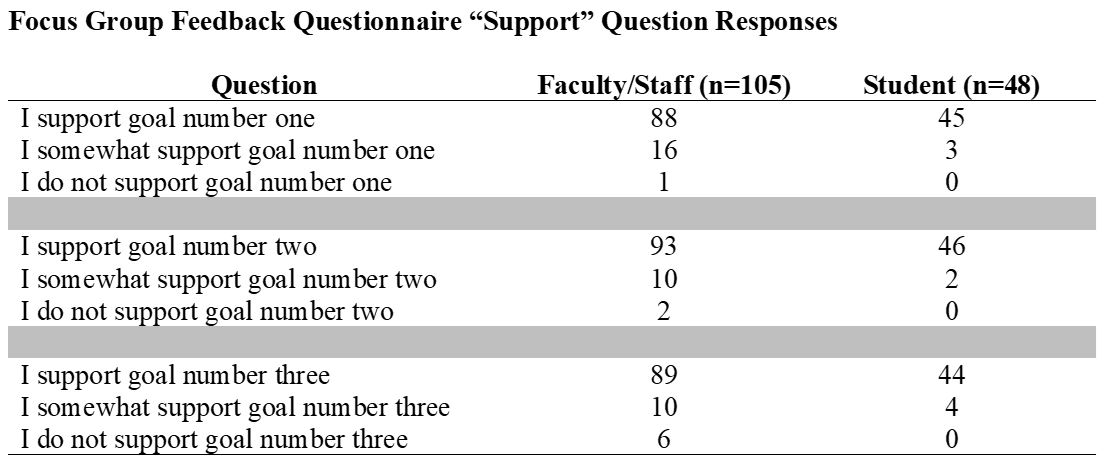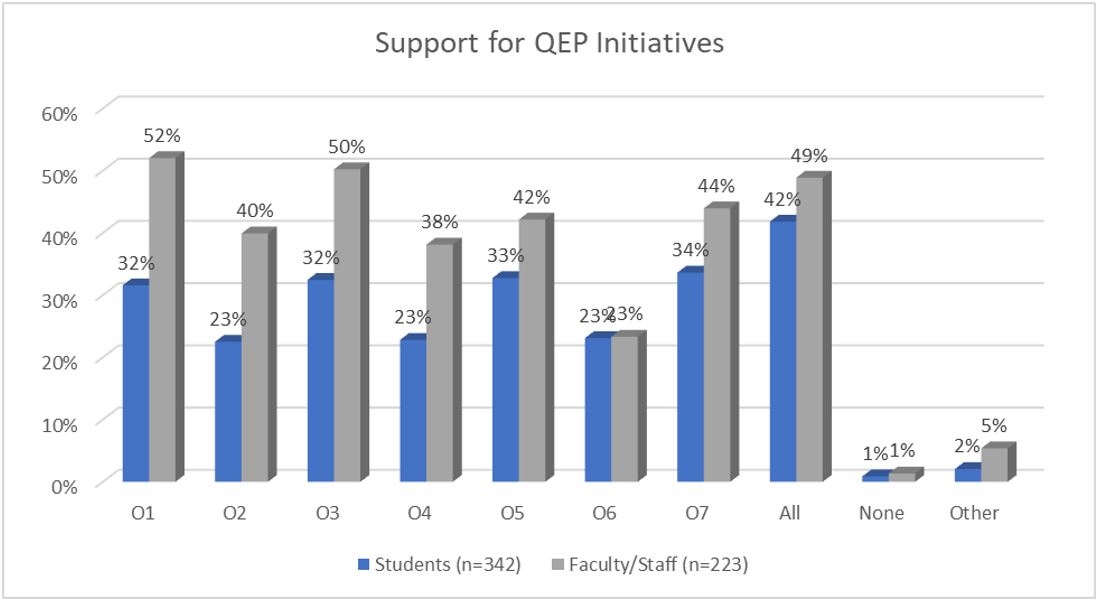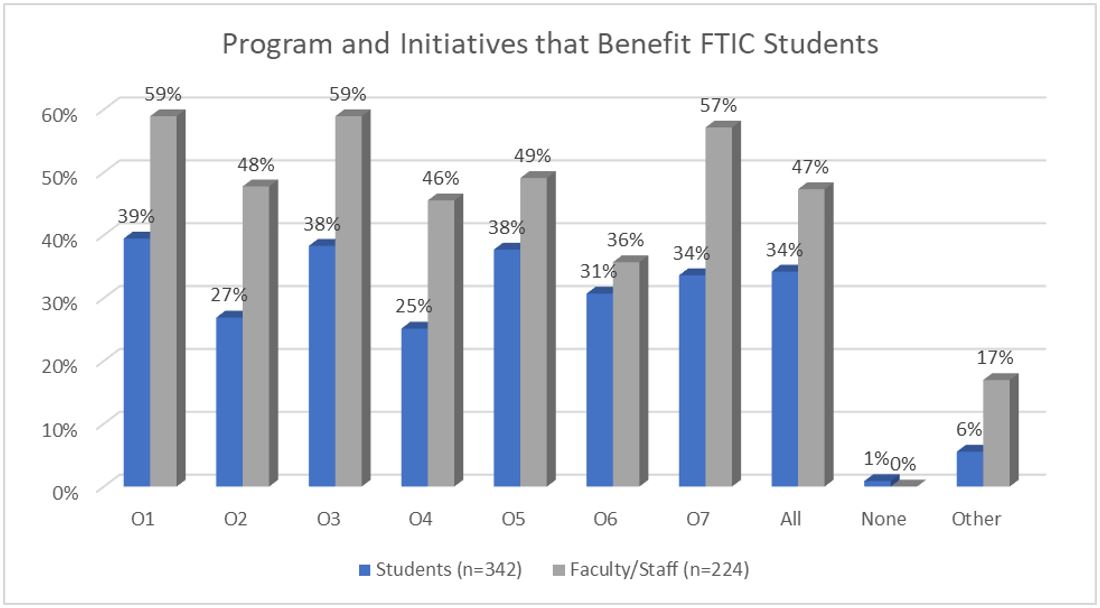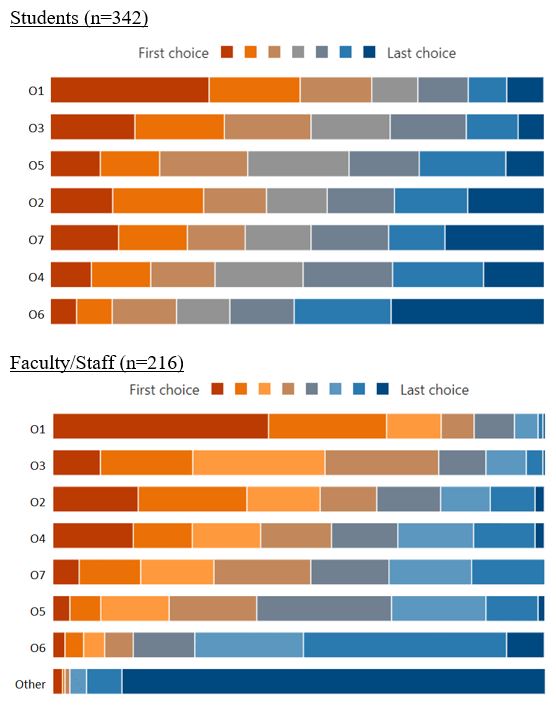Meetings and Focus Groups
In accordance with SACSCOC standard 7.2, the QEP is required to have broad-based support
of institutional constituencies. To comply with this standard, the QEP development
team encouraged district participation through meetings and focus groups (both virtual
and in person), and internal surveys. A list of meetings and focus groups with constituent
groups, locations, and attendance can be seen in the document titled "Meetings and
Focus Groups" to the right-side column of the page. Regarding focus groups in particular,
at the conclusion of each session, participants were asked to provide feedback through
a digital QR code that took them to an online feedback form. With this questionnaire,
focus group participants were able to show support or lack thereof for the QEP goals
and objectives, as well as provide open-ended feedback. Feedback from the focus groups
indicated that all three goals had significant support from faculty, staff, and students,
as shown in Figure 1.
Figure 1
Open-ended feedback from students indicated that they commented most on the need for a re-vamped orientation, the benefit of additional mentorship intervention programs, and the importance of increasing awareness about Collin College’s support resources. While 69 students attended focus groups across the district, only 48 of them completed the QR code survey.
Open-ended feedback from faculty and staff showed that there were some concerns about the first-year seminar course being required for credit. Faculty and staff also expressed a need for more information about what a central office of FYE would do and how it would look in practice. Other themes that emerged from faculty and staff feedback was the applicability of the first-year seminar to workforce degrees, as well as the feasibility and scalability of learning communities. Despite these concerns, the objectives still received broad support across constituent groups. While 142 faculty and staff members participated in focus groups across the district, only 105 of them completed the QR code survey.
Internal Survey Participation
Throughout the months of September and October, 2023, students, faculty, and staff
were invited via email to participate in a survey designed to capture their attitudes
about the proposed QEP goals and objectives. Two surveys were created; one for students
and one for faculty and staff. Questions about the QEP goals and objectives were roughly
the same. However, the student survey contained questions about student demographics
while the survey for faculty and staff had questions specific to college personnel.
These demographic details can be sign in the document titled "Survey Participant Details"
in the right-side column of the page.
As shown in Figure 2, student, faculty, and staff groups each showed broad support for the QEP initiatives with only 1% of respondents indicating no support. In addition, Figure 3 shows that the FYE objectives proposed in the QEP adequately captures the concept of a robust first-year experience since respondents were much more likely to select the proposed objectives over the “Other” option.
Figure 2
Figure 3
When asked to rank the QEP objectives, students, faculty, and staff selected pre-term orientation and an early alert system as the top two priorities. For the third highest priority, students selected targeted intervention programs while faculty and staff selected the first-year seminar. Students ranked the first-year seminar fourth out of all seven objectives. For students, faculty, and staff, the learning communities objective was ranked seventh, though 1 in 3 students, faculty, and staff members reported that learning communities would be beneficial for FTIC students. These results are depicted in Figure 4.
Figure 4
Conclusions from District Participation
Results from district participation in the development of the QEP show that each goal
has significant support across multiple constituent groups. Likewise, each constituent
group indicated that the proposed goals and objectives are appropriate to address
first-year student success and help students with their transition to college life.
Students, faculty, and staff seem to agree that pre-term orientation, an early alert
system, and a first-year seminar are high priorities for first-year student success.
Overall, students voiced little concern over Collin’s ability to carry out these objectives and indicated a high level of confidence in Collin’s ability to implement them. Faculty and staff expressed more reservations about Collin’s ability to adequately plan for and execute the objectives, but still communicated broad support in the goals and objectives themselves.
Following the completion of the survey and focus group sessions, an FAQ document was created to address concerns frequently mentioned by students, faculty, and staff, and to provide clarity on the QEP’s more complex objectives. These FAQs were then posted to the QEP website for review by all Collin College constituents.






